Variable Production Cost Variance Analysis Iron Products Inc
Variable Production Cost Variance Analysis Iron Products Inc. produces prefabricated iron fencing used in commercial construction. Variable overhead is applied to products based on direct labor hours. The company uses a just-in-time production system and thus has insignificant inventory levels at the end of each month.
The company\'s income statement for the month of November comparing actual results with the flexible budget based on actual sales of 2,000 units is shown below.
Actual
Budget
Variance
Sales
$1,805,000
$1, 800 ,000
$(5,000 )
Favorable
Variable cost of goods sold
867,4 00
800 ,000
67,4 00
Unfavorable
Variable selling and administrative expenses
250,000
240,000
10,000
Unfavorable
Contribution margin
687,600
760,000
72,400
Unfavorable
Fixed cost of goods sold Fixed selling
575,000
580,000
(5,000)
Favorable
administrative expenses
117,000
120,000
(3000)
Favorable
Net Profit
(4,400)
60,000
64,000
Unfavorable
Iron Products is disappointed with the actual results and has hired you as a consultant to provide further information as to why the company has been struggling to meet budgeted net profit. Your review of the above budget versus actual analysis identifies variable cost of goods sold as the main culprit. The unfavorable variance for this line item is $67,400.
After further research, you are able to track down the following standard cost information for variable production costs:
Direct materials (50 pounds per unit at $5 per pound) $250
Direct labor (3 hours at $20 per hour) 60
Variable overhead (3 direct labor hours at $30 per hour) 90
Standard variable production cost per unit $400
Actual production information related to variable cost of goods sold for the month of November is as follows:
• 2,000 units were produced and sold.
• 110,000 pounds of material were purchased and used at a total cost
of $528,000.
• 5,600 direct labor hours were used during the month at a total cost
of $134,400.
• Variable overhead costs totaled $205,000.
Required
a. Calculate the material s price variance and materials quantity variance. Clearly
label each variance as favorable or unfavorable.
b. Identify the highest favorable variance and highest Calculate the labor rate
variance and labor efficiency variance. Clearly label each variance as favorable or
unfavorable.
c. Calculate the variable overhead spending variance and variable overhead
efficiency variance. Clearly label each variance as favorable or unfavorable.
d. List each of the six variances calculated in requirements a, b, and c, and total the
variances to show one net variance. Clearly label the net variance as favorable
or unfavorable. Explain how this net variance relates to variable cost of goods
sold on the income statement.
e. Identify the highest favorable variance and highest unfavorable variance from the
six listed in requirement d, and provide one possible cause of each variance.
| Actual | Budget | Variance | ||
| Sales | $1,805,000 | $1, 800 ,000 | $(5,000 ) | Favorable |
| Variable cost of goods sold | 867,4 00 | 800 ,000 | 67,4 00 | Unfavorable |
| Variable selling and administrative expenses | 250,000 | 240,000 | 10,000 | Unfavorable |
| Contribution margin | 687,600 | 760,000 | 72,400 | Unfavorable |
| Fixed cost of goods sold Fixed selling | 575,000 | 580,000 | (5,000) | Favorable |
| administrative expenses | 117,000 | 120,000 | (3000) | Favorable |
| Net Profit | (4,400) | 60,000 | 64,000 | Unfavorable |
Solution
Part 1 - Calculation of Material Price Variance and Material Quantity Variance
100000 pound
(50*2000)
$4.8
($528000/110000)
$500000
(100000*$5)
Calculation of variances
Material Price Variance
(Standard Price - Actual Price)*Actual Quantity
$22000 Favourable
($5-$4.8)*110000
$50000 Unfavourable
(100000-110000)*$5
Part 2 - Direct Labour Variances
6000
(2000*3)
$24
($134400/5600)
$120000
(6000*$20)
Calculation of variances
Labour Rate Variance
(Standard rate - Actual rate)*Actual Hours
$22400 Unfavourable
($20-$24)*5600
Labour Efficiency Variance
(Standard Hours - Actual Hours)*Standard Rate
$8000 Favourable
(6000-5600)*20
Part 3 - Variable Overhead Variances Calculation
6000
(3*2000)
$36.607
($205000/5600)
Calculation of variances
$37000 Unfavourable
($30-$36.607)*5600
$12000 favourable
(6000-5600)*30
Part 4 - Calculation of Net variance
Explanation - Net Variance calculated is the same as combined Variance of variable cost of goods sold i.e. $67400.
The bifurcation of Combined variance of variable costvof goods sold helps us to analyse and Interpret the different items of variance viz. Material, Labour and Variable overhead to focus on better manage the business.
Part 5 - 1) Hence Highest Favourable variance = Material Price Variance i.e. $22000 F
Cause = Since Actual rate is lowen than budget rate, it is favourable for company
2) Highest Unfavourable variance = Material Quantity Variance i.e. $50000 U
Cause = Actual Pound used for 2000 units are more than budgeted pound to be uses to produce 2000 units hence it is unfavourable for Company
Causes for other Variances
1) Labour Variance
Favourable = In case of rate variance, When Actual rate is lower than budgeted rate per hour and in case of efficiency variance, When actual Hour worked are lower than budgeted hours for output/Produce
Unfavourable = in case of rate variance, Actual rate is more than budgeted rate and in case of efficiency variance, when actual efficiency is less than standard efficiency for a given output.
3) Variable Overhead variance
Favourable = in case of spending variance, Actual rate is lower than budgeted rate and in case of efficiency variance, Actual efficiency should by higher i.e. lower hours worked for same output
Unfavourable = In case of spending variance, Actual rate is higher than budgeted rate and in case of efficiency variance, Actual hours worked are more than Budgeted hours.
| Particulars | Flexible Budget | Actual Data |
| Units | 2000 | 2000 |
| Pound of Material | 100000 pound (50*2000) | 110000 (Give) |
| Rate Per Pound | $5 | $4.8 ($528000/110000) |
| Total Material Cost | $500000 (100000*$5) | $528000 (given) |
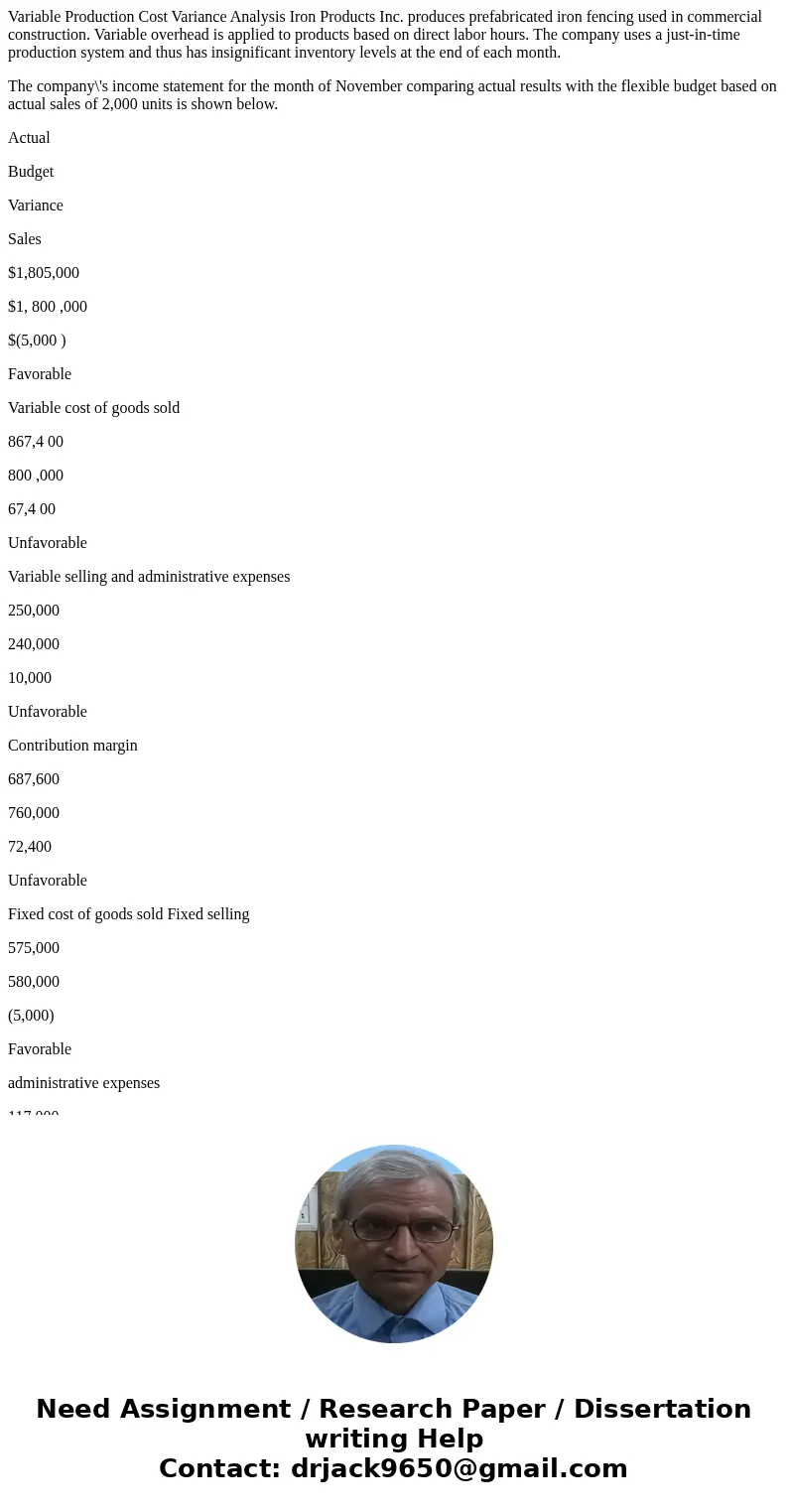
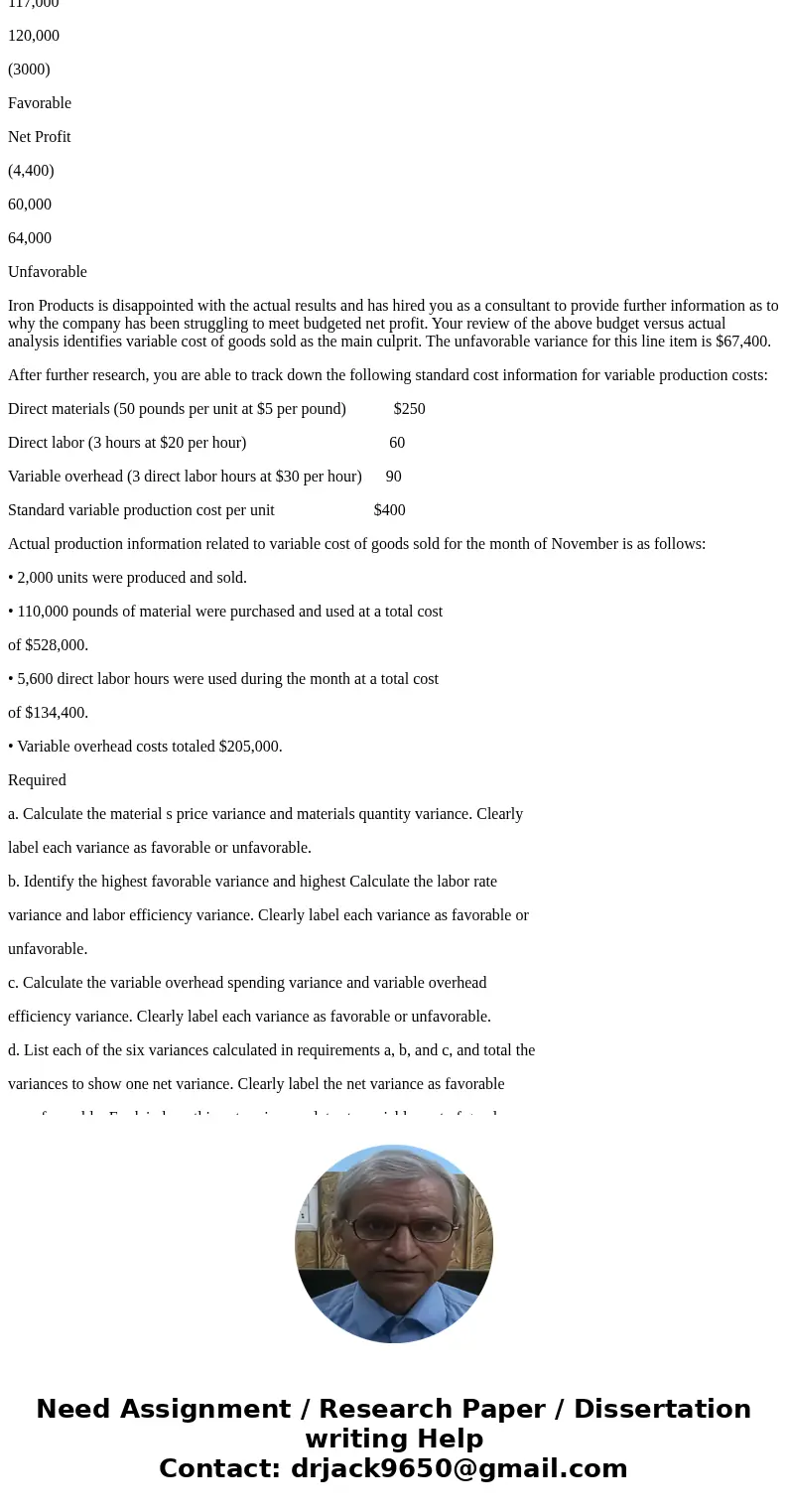
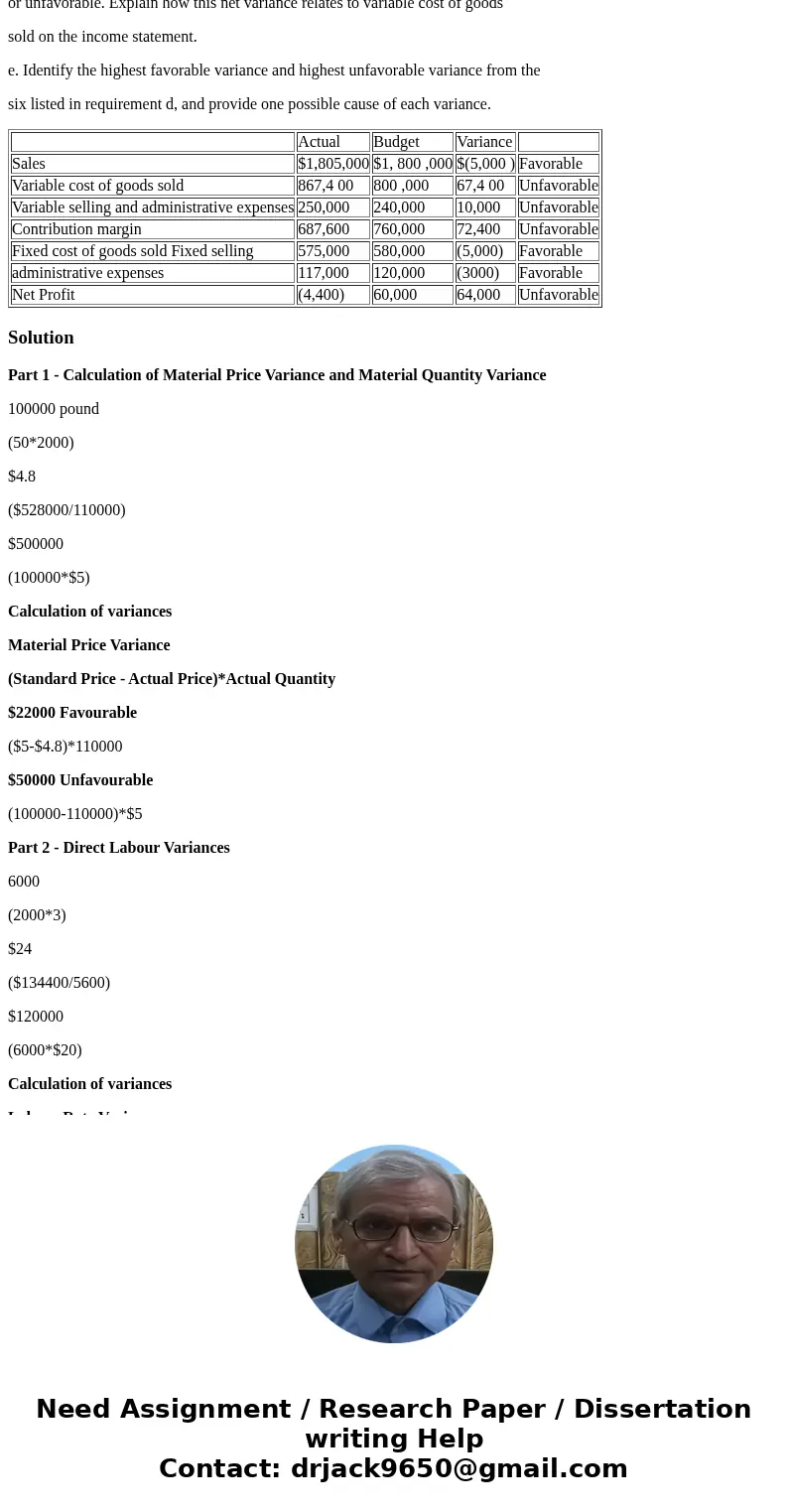
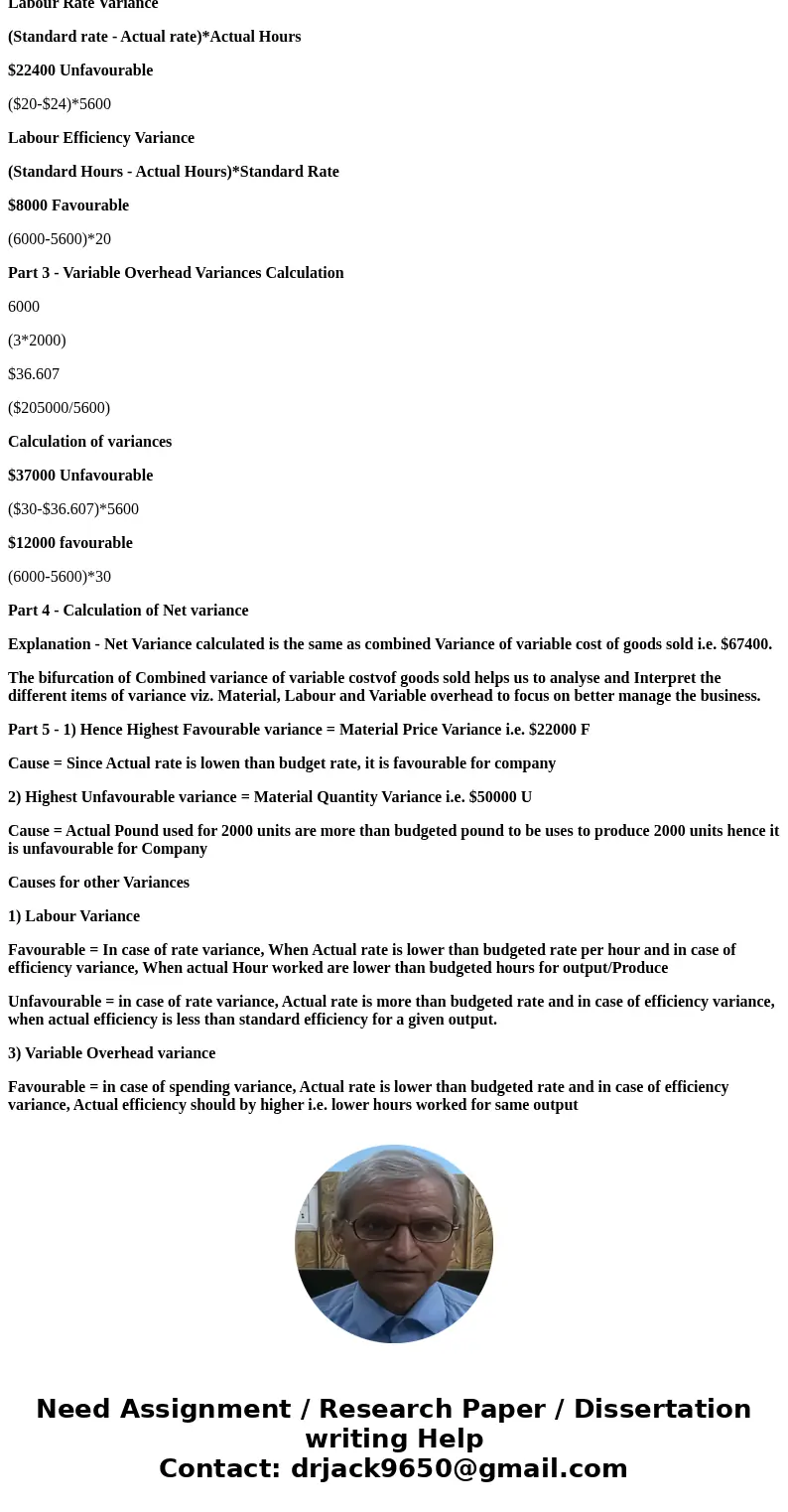
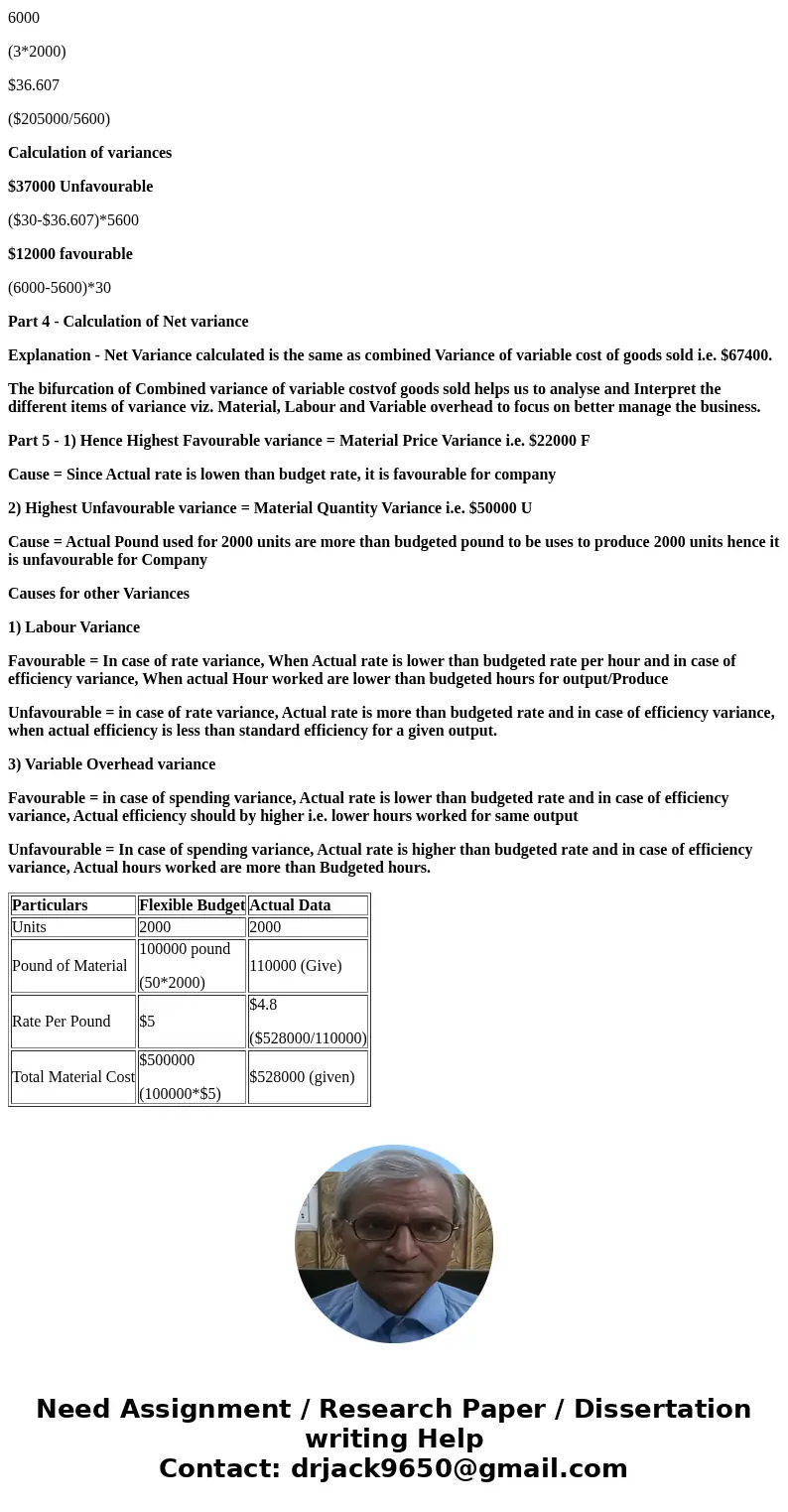
 Homework Sourse
Homework Sourse